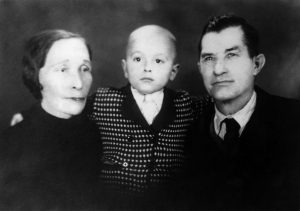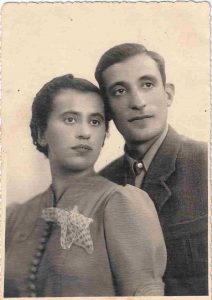Alik Abramovich
Alik was born on 9 May 1941 in Kaunas. His father Shlomo Abramovich moved to Kaunas from Klaipeda in a search for a work. His mother Feiga, née Kulbak, was an active member of the Lithuanian Communist Party. After the infamous Ribbentrop–Molotov Pact and the occupation of Lithuania by the USSR, she was appointed to be in charge of the big factory ‘Jega’, which means ‘Strength’ in Lithuanian.
When the Germans invaded Lithuania, the Abramovichs and their newborn son tried to escape by foot to Russia. They were captured by Lithuanians and forced to return to Kaunas. Shlomo was arrested, but the very brave Feiga went to the Gestapo, and by some miracle succeeded in releasing him.
Shlomo and Feiga decided immediately to join the anti-fascist detachment, but first they needed to find a safe place to hide their child. While they were looking for somebody they could trust, Brone Rosenbergiene, a Lithuanian worker in the factory and her husband Jonas, a shoemaker, managed to locate their old friends the Abramovichs in the ghetto, and together they started to plan Alik’s rescue.
Although Alik was not circumcised, it wasn’t an option to transfer him to the Rosenberg family because their neighbours were serving in the SS. Their close friend Marcele Galvonaite was afraid to keep Alik with her for the same reason.
After an intensive search, the Rosenbergs and Marcele Galvonaite found a safe place for Alik with Jonas and Stase Statauskas in the countryside. Marcele and Jonas Statauckas came to take Alik from the ghetto gates. Alik’s father (or, according to another version, a German soldier) smuggled Alik, wrapped in tatters, and gave him to the rescuers. When Alik was in safe hands, his parents joined the detachment. Shlomo was the first to escape from the ghetto. Feiga told me that she asked Chaim Elin’s help to reach the detachment. Elin said, ‘With your brains and energy you need nobody’s assistance.’ He was right, and very soon Feiga found her way to the forest.
Shortly before the liberation, Shlomo Abramovich was killed in battle, together with Yankale Levy.
The Statauskas couple paid the heaviest price for Alik’s rescue. When, after the liberation, Alik’s mother came to take him back, it became evident to all the villagers that Statauskas had harboured a Jewish boy. Feiga was sure it was very dangerous for the Statauskas family to stay in the village; she suggested that they should move with her to Kaunas. Sadly they refused and were killed by Lithuanian bandits, the ‘Zhaliukai’ in 1946.
After the war, Feiga married Naum Meriesh, who returned from Siberia, where he had been deported with his family before the war. After finishing school, Alik went on to study at the Kaunas Polytechnic Institute, but he did not complete his studies and returned to work in the factory.
I knew Alik from the Jewish kindergarten. We became close friends during our school days and in 1964 I married him. Our son was born in 1966 and was named Solomon (Shlomo) in memory of Alik’s father. It turned out that both of us were among the ‘hidden children’.



